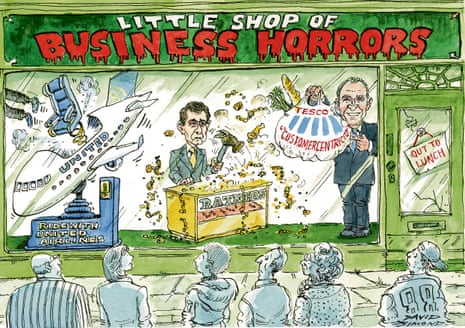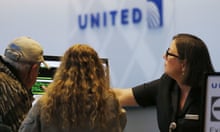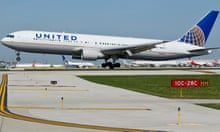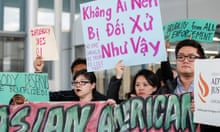United Airlines has been compared to Gerald Ratner after its extraordinary reaction to a passenger on one of its planes being dragged away with a bloodied face by security guards.
Ratner, as a reminder, is responsible for probably the most famous PR gaffe of all time. He was chairman of the high street jewellery firm Ratners when during a speech in 1991 he described one of his products as “total crap”, saying that earrings sold by the business were “cheaper than an M&S prawn sandwich but probably wouldn’t last as long”. After the speech the company nearly collapsed, and he was fired less than two years later.
United’s disastrous week, however, was totally different from “doing a Ratner”, as the moment came to be described. While the jewellery boss’s error lay in being outrageously frank and honest in his assessment of his company, United got into trouble because it did the exact opposite and slipped into corporate-speak.
Oscar Muñoz, chief executive of United Airlines, apologised for having to “reaccommodate” passengers on the plane and said his staff had “followed established procedures”. David Dao – the man who was dragged from the plane, suffered concussion and now apparently needs reconstructive surgery on his face – had been politely asked to “deplane” but was “disruptive and belligerent”.
What do any of these words even mean? They are exercises in gobbledygook. Amusingly, the online Urban Dictionary has changed the definition of “reaccommodate” to a euphemistic term for an airline’s decision to “knock out and then drag off unconscious passengers”.
Even worse was Muñoz’s comment that staff “followed established procedures”. OK, so he was trying to protect staff, but procedures established for what? Acting like a corporate robot, not a human being?
As for Muñoz’s comments about Dao being “disruptive and belligerent” after being asked to “deplane” – surely many people would be disruptive and belligerent after being subjected to such distortion of the English language. “Deplane” may be a common term on American flights, but that does not make it right. Also, in the US it tends to be used by the pilot to invite passengers to leave the plane when they arrive at their destination, not to describe kicking someone off the aircraft before it has even taken off.
It is important to deconstruct what United and Muñoz said because, sadly, they are not alone in using this kind of language, and it is symptomatic of a wider issue: namely the lack of connection between the boardroom and a company’s workers and customers.
Dave Lewis, the chief executive of Tesco, was in the spotlight last week for regularly slipping into corporate-speak. For example, he praised Tesco’s “customercentricity”.
This type of usage portrays big businesses as machines whose cogs – the workers – behave according to set directions and procedures. It takes away the human side of making decisions and thinking on the spot. It also helps to divert responsibility. Muñoz’s initial comments did not blame the staff involved– because they were just following procedures – but nor did they attempt to explain who had put those procedures in place, or question whether they were right.
In this post-Ratner world of rolling news and social media, chief executives seem more fearful than ever that something they say will come back to haunt them. But that should not stop them from engaging with staff and customers openly.
Too often, chief executives seem to prioritise addressing shareholders rather than staff or customers. Strategic reviews are a good example of this – companies are constantly giving them names and timetables. Unilever’s is called Connected 4 Growth.
This may perhaps impress shareholders and make it look like something is at least happening within the business, but how much does it really matter to the workers who implement it and the customers who buy the product or service? Nothing. As Ratner would say: it is total crap.
Barclays boss must be censured over hunt for whistleblower
Jes Staley and Barclays should thank United Airlines. Until David Dao was dragged off the US carrier’s flight there was a bright spotlight on Staley and Barclays’s own extraordinary gaffe: trying to find a whistleblower.
A quick recap of the Barclays story: when Tim Main was hired to the bank in a senior position, a couple of letters were sent to the board and a senior executive making allegations about his past conduct. Main and Staley had worked together for years at JP Morgan: sources say Staley was already aware of these past issues and felt that not only were the allegations unfounded, but that someone was trying to smear his long-time associate.
As a result, Staley twice asked the internal security team at Barclays to track down the whistleblower. The first time, Staley was told to back off by compliance. The second time was after the allegations had been cleared by the bank and the security team received help from a US law enforcement agency, thought to be the US Postal Inspection Service.
They failed, but eventually their antics were flagged to the Barclays board by a different whistleblower.
Staley now faces a significant cut to his bonus, and worse could follow. The Financial Conduct Authority and the Prudential Regulation Authority are investigating him. They have strict rules about protecting whistleblowers and have the power to ban Staley from working in the City of London.
A block on Staley is unlikely. The board of Barclays seems to think so too, because if there were a genuine chance that he could be banned, they would surely have taken pre-emptive action and asked him to resign rather than face the embarrassment of being forced into a change by the regulator.
In his defence, Staley appears to have been trying to protect a friend who he felt was being harassed. However, after the events of the financial crisis it is essential that bankers follow best practice and that those who flout the rules are punished.
Nothing and no one should discourage whistleblowers from coming forward. The nature of whistleblowing means the informant is likely to be going against the grain of a company or the wishes of a manager. Therefore, while Staley is likely to keep his job, he should be publicly shamed.
Electricity up again! What are we going to do with you?
Every time electricity companies raise their prices, as EDF has done for the second time in the space of a year, bill payers hear the same vague threats issued by those with the power to act.
In March, Theresa May said the energy market was “manifestly not working for all consumers”, while Ofgem just said that EDF’s rise was “difficult to justify”.
This sounds like an exhausted parent sighing “Stop that!” at a naughty toddler. If the child knows no punishment will be forthcoming, why stop misbehaving?
The government is supposed to be publishing plans to help energy consumers later this month. Given the ridicule heaped on Ed Miliband when, as Labour leader, he suggested capping energy prices, that solution is surely unlikely.
But the plans will need to contain something to give the “Big Six” energy firms pause for thought. Otherwise they will continue to do as they please.








